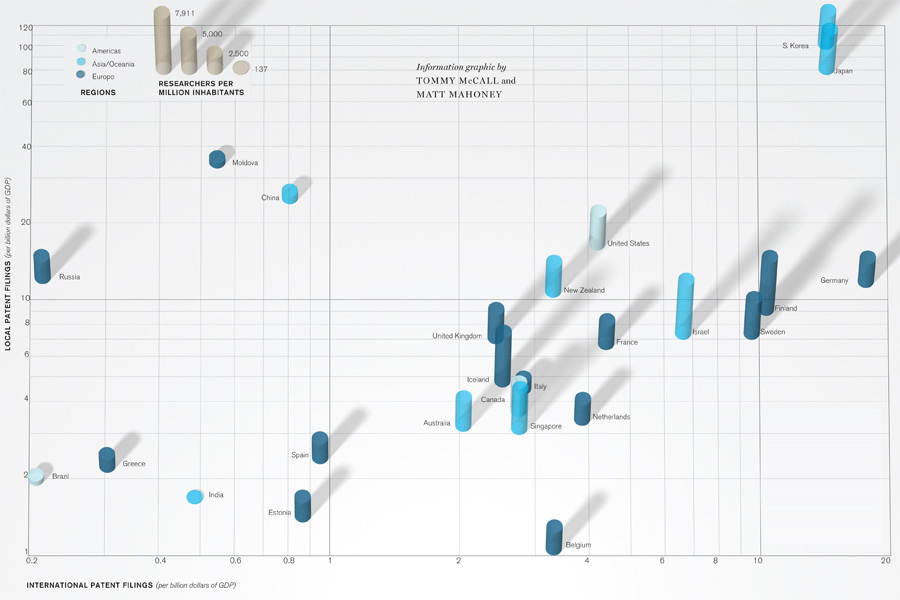World of Ideas

Which country is more devoted to inventing things—the United States or Moldova?
We crunched data for dozens of countries to see which ones generate an outsize number of ideas, relative to their economic might or R&D resources. After eliminating countries below certain thresholds, we plotted the results here.
In countries that are higher on the graph, residents file more patents for every dollar of GDP. In countries that are further to the right, residents apply for proportionally more international patents, which tend to be more valuable because they cover multiple markets. The height of each country’s bar reflects the percentage of its people employed in R&D.
So people in Moldova, one of the poorest countries in Europe, apply for relatively more patents, but Americans have a much greater tendency to target multiple markets. Meanwhile, Finland has a higher percentage of R&D workers than either country.
Admittedly, this is an imperfect gauge. Some patents are far more important than others. And some countries require applicants to combine related inventions in one filing. But it’s a reminder that inspiration flickers everywhere.
Information graphic by Tommy McCall and Matt Mahoney
Sources: World Bank; UNESCO Institute for Statistics; World Intellectual Property Organization; Israeli Central Bureau of Statistics; U.S. National Science Foundation.
International patent filings refer to patent applications that are made in a country or countries other than the applicant’s own.
The number of people in R&D is a full-time equivalent, meaning that multiple people working part time can account for a single position.
Figures are from 2008, 2007, or 2006, depending on the most recent data available.
Keep Reading
Most Popular
Large language models can do jaw-dropping things. But nobody knows exactly why.
And that's a problem. Figuring it out is one of the biggest scientific puzzles of our time and a crucial step towards controlling more powerful future models.
The problem with plug-in hybrids? Their drivers.
Plug-in hybrids are often sold as a transition to EVs, but new data from Europe shows we’re still underestimating the emissions they produce.
Google DeepMind’s new generative model makes Super Mario–like games from scratch
Genie learns how to control games by watching hours and hours of video. It could help train next-gen robots too.
How scientists traced a mysterious covid case back to six toilets
When wastewater surveillance turns into a hunt for a single infected individual, the ethics get tricky.
Stay connected
Get the latest updates from
MIT Technology Review
Discover special offers, top stories, upcoming events, and more.